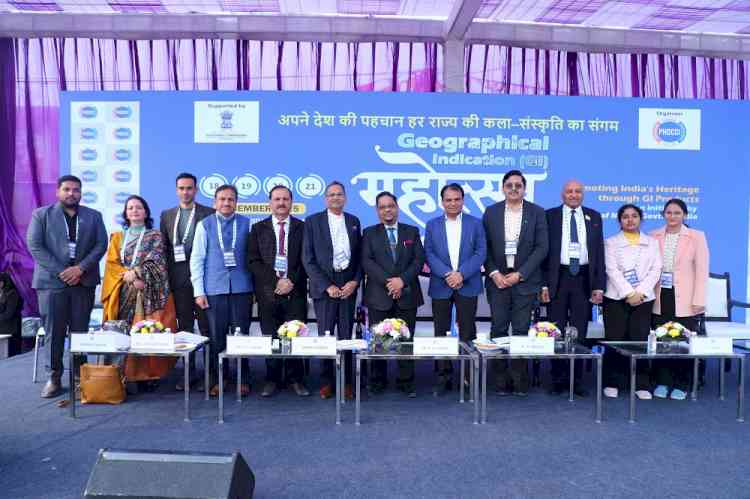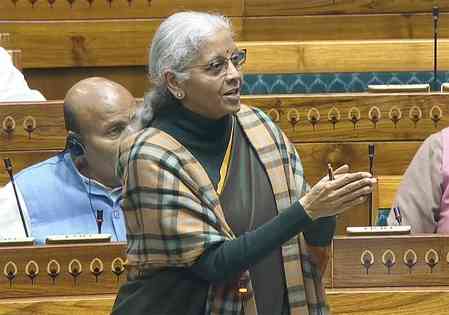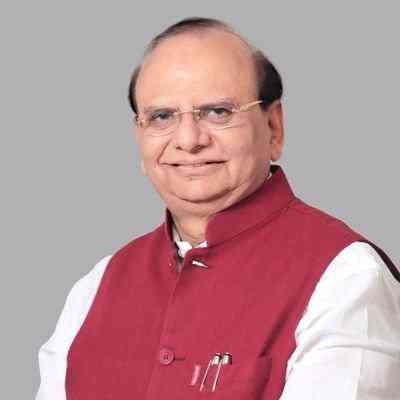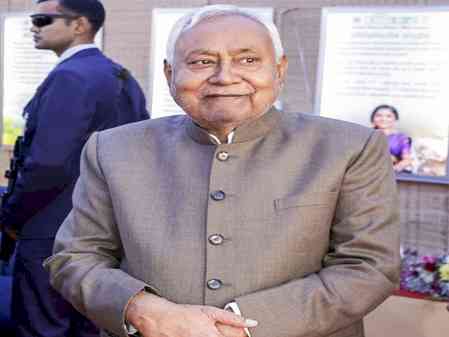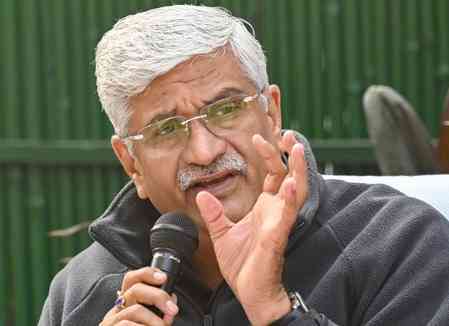Industry reactions on Union Budget (Part-13)

Sashi Kumar, Head of Sales, Indeed India
“Despite a global slowdown, India has seen sustained job growth in a few sectors. Indeed data shows that overall job postings as of January 2023 stands at 203% above the pre pandemic baseline of February 2020. The government’s strong push towards a technology-driven and knowledge-based economy will boost job creation across sectors, especially in healthcare, technology and renewable energy.
According to Indeed’s data, nursing has had the highest job postings as of December 2022 and this is likely to increase with the government's push towards improving nurse-patient ratio. The focus on reducing the country's carbon footprint is also expected to create more green jobs in EV and renewable energy sectors. Indeed’s platform saw an increase of 468% for ESG job roles in the past three years.
The increased capital expenditure would mean strong growth in the job market especially in the blue collar workforce. Our research revealed that a 9-11 million strong gig workforce is to be added to our job market in the next three years. It will be interesting to see how the job market shifts in the next couple of quarters as India might experience the after-effects of global recession.”
Anirudh Ravi Narayanan, CEO, BNC
"Budget 2023 had no big surprises for EV manufacturers. We expect that the FAME subsidy will expire once the fund is consumed. Overall, it's a sign that the EV industry's crutches are coming off - the end of an era for the industry. Fortunately, we are prepared for it and have been anticipating this future, so we applaud the Government's stance."
Ajay Kumar Srivastava, MD&CEO, Indian Overseas Bank
“Budget 2023 is a balanced budget prioritizing Infrastructure & Investment, Green growth, inclusive development and reaching the last mile.
Rs 9,000 crore for revamping Credit Guarantee Scheme in MSMEs is a welcome step.”
Murali Ramakrishnan MD and CEO of The South Indian Bank
"This year’s Union Budget is noteworthy on a number of counts. Effective implementation of schemes like opening of 47.8 crore PM Jan Dhan bank accounts will benefit common citizens. With the establishment of the Urban Infrastructure Development Fund (UIDF), we expect infrastructure in tier 2 and tier 3 cities receiving a significant boost. The enabling of the Digital locker for MSMEs for securely storing and sharing documents online with various authorities, regulators and other entities will encourage seamless business."
Kshitish Nadgauda, Senior Vice President and Managing Director, Louis Berger WSP
“We welcome the government’s move of hiking the capital expenditure for infrastructure development by 33 percent to Rs 10 lakh crore. The Union Budget of 2023-24 presented by the Hon’ble FM is progressive, growth-oriented and inclusive with a major focus on infrastructure investment as one of the seven key priority areas for the coming fiscal year and has identified 100 top priority projects. The establishment of an infrastructure finance secretariat will further aid in attracting more private investment and streamlining public-private partnerships. Moreover, the setting up of the Urban Infrastructure Development Fund will provide an impetus to infrastructure development in Tier-2 and Tier-3 cities across the country. This will accelerate the efficient use of land resources, enable adequate resources for urban infrastructure including transit-oriented development, enhanced availability and affordability of urban land, and, most importantly, job creation. It is widely accepted that such investment in infrastructure development especially urban mass transit enables urban centres to flourish and attract quality investment, and result in a vastly improved quality of life for residents.
In addition, there are multiple other infrastructure outlays such as 50 new airports and heliports, coastal shipping, etc. which will enhance intermodal connectivity, which are significant steps in enhancing mass transit. These steps will help in achieving the expected goal of the $5 trillion GDP economy by 2024-25.”
Siddharth Chaturvedi, Director at AISECT
"The budget announcement is highly motivating. We welcome the positive steps taken toward the education and skilling sector. The budget is high on the commitment to make India a source of skilled workforce for the global world by announcing the setting up of 30 India international skill centers. There has been a noticeable gap in skilling and upskilling programmes in our current education system that restricts learners from getting in-demand, industry-ready skills. This move would channel the energy in the right direction and enable the young workforce to have the skills to lead the economy forward.
Secondly, we appreciate the decision makers for PM Vishwakarma Kaushal Saman scheme. The scheme will enable the traditional artisans and the rural micro-entrepreneurs to link up with the MSME chain, which will impact both skills and entrepreneurship development in rural areas.
Thirdly the budget stood on much pending demand of reimagining teacher education and district education institutions as a vibrant center for teacher training. The digital push is very visible in Budget 2023 with the renewed push on the National Digital University, which was announced last year. The idea of setting up 100 labs to develop applications using 5G services will become a destination for young minds to create a new range of opportunities, apps, business models, and employment potential. This kind of open innovation platform will benefit both academia as well as the industry."
KS Bhatia, Founder, Pumpkart and co- founder of Figgital
“Finance Minister Nirmala Sitharaman has opened up a plethora of opportunities for agri-start ups. The Central government’s announcement to set up Agriculture Accelerator Fund (AAF) to encourage innovative start-ups in rural areas will give a big boost to agri-startups too. At the moment India has more than 100 agri-startups that are going to be benefited from this AAF. AAF will give a big boost to the funded and non-funded startups. Tax redemption to startups from seven to 10 years is another boost to upcoming startups.”
Ranjan Kumar, founder and CEO, Entropik
“It is exciting to see that the Union Budget 2023 recommends a greater emphasis on artificial intelligence research, as well as employability, e-skilling, and job creation in the startup sector. With India currently having the third largest ecosystem for start-ups in the world and ranking second in innovation quality among middle-income nations, it is encouraging to see the implementation of innovative policies and initiatives to support the growth of startups and frontier technologies in the country.
The proposed three Centers of Excellence for Artificial Intelligence to realize the vision of Make AI (Artificial Intelligence) in India and Make AI Work for India aimed at developing the country’s AI ecosystem is a decisive step towards promoting AI and allied technologies in India. Additionally, the launch of the National Data Governance Policy to enable access to anonymized data will be instrumental in unleashing innovation and research by startups and academia. As stated during the budget, this initial step in catalyzing the era of digital government will also offer greater opportunity for better, more informed decision-making while adhering to the highest data protection standards and dedication to data privacy.
Given the emphasis on research, entrepreneurship, and startups, it is certain that startups will play an important role in job creation, providing employment, and innovations. The Union Budget will unleash our nation's and economy's full potential. Furthermore, implementing policies that aid in boosting private sector involvement in frontier technology and artificial intelligence (AI), as well as focusing on the academic and skilling environment, would undoubtedly attract and grow highly trained digital talent in the country.
We applaud the government's planned tax holiday for start-ups; this is an excellent move for improving the country's start-up ecosystem. This growth-focused budget considers all variables and challenges, and we congratulate Finance Minister Smt. Nirmala Sitharaman for presenting a budget that addresses all issues and puts India on a higher growth trajectory.”
Anand Desai , Managing Director- Anupam Rasayan India Ltd.
“The announcement of Union Budget 2023-24 focuses on Inclusive development that includes massive development of infrastructure, green energy, youth power, and strengthening of financial sector that will reinforce macro stability of the Indian economy. The focus areas of this year's budget will build the foundation and the blueprint for the Amrit Kaal eventually helping India achieve the ambitious target of India at 100. A lot of emphasis has been put on ease of doing business where more than 39,000 compliances have been reduced.
The Indian chemical industry is a sector that has contributed 7% of the country's GDP in 2022. Keeping the same into consideration, we are happy with government’s initiative to exempt basic custom duty on certain raw materials - Denatured ethyl alcohol, acid grade fluorspar and crude glycerine that will boost overall production capacity of Indian chemical companies. This exemption in raw materials will enhance the manufacturing and encourage exports of specialty chemicals in the global market.
For agriculture and its allied sectors, Finance Minister stated the PM Pranam Scheme, which will promote balanced use of fertilizers reducing fertilizer subsidy bill. Furthermore, the increasing importance of Europe & China +1 strategy adopted by multiple nations is expected to drive the demand for Indian chemical industry. These initiatives are aimed at fostering a sustainable development of the chemical industry in India, and to help the industry become a leading sector in the global market. The budget overall has delivered on expectations leading before the general election next year year. With this we hope the economy to move higher on the back of pro-growth measures announced today, moreover the balance between managing the fiscal deficit and giving some relief to citizens from high inflation has been well thought off.”
Divya Gokulnath, Co-founder, BYJU'S
“With a focus on digitalization and formalization, the budget is investing in digital public infrastructure that will position India for continued growth and competitiveness. The education sector is a key area of investment, with the launch of PM Schools for Rising India, the recruitment of 38,800 teachers, and the establishment of a National Digital Library for children. These initiatives will help equip students with the skills and knowledge needed for success in the future, and the emphasis on teacher training and innovative pedagogy will ensure that the quality of education in India continues to improve. This forward-thinking budget sets India on a path towards self-reliance and global competitiveness.”
Ankur Nijhawan, CEO, AXA France Vie India Reinsurance Branch on Insurance Sector
“This budget has touched upon various facets of major importance to our economy including focus on last mile, green growth, infrastructure and development, youth power and inclusive development. Focus on agriculture sector with enhancing storage capacities and establishing an accelerator fund for startups serves as a watershed to increase earnings and innovation in this segment. Budget allocation towards research in pharma and health is a step in the right direction which would further make India atmanirbhar. Budget has also very aptly recognised the importance of AI by allocation of funds towards setting up of specialised AI centres in educational institutes which would enable finding solutions in agri, health and sustainable cities. Reduction in duties on goods for manufacturing lithium-ion batteries would be a major step to reduce cost of EVs and promote green growth.
Further, change in the income tax slabs is a major development towards making India a more consumer driven economy. It would leave more money in the hands of individuals giving them the liberty and power to decide where to spend. The new tax regime does not allow exemptions on savings like the earlier one. This change poses a major need for sectors like insurance to create a product which is consumer focused. Consumer has so far been buying it to avail tax incentives however, this new change demands that the sector revamp its offering to meet consumer expectations and servicing requirements to create demand by offering customised, user friendly offerings and improving the customer experience.”
Gautam Chopra, Co-Founder, and CEO, BeatO
“Even though the Budget this year focuses on strengthening the healthcare infrastructure, it is prudent to point out that the growing demands on our healthcare system cannot be met only by increasing the physical infrastructure. The setting up of 157 new nursing colleges is a huge step towards meeting the ever growing demand for providing care through paramedical staff. However, for care to reach those who really need it, it is imperative that they can leverage simple and affordable digital technology, which will help them reach the masses and serve them more efficiently. Integrating this initiative with the Ayushman Bharat Digital Mission will be key to delivering services to the last mile.
Indian pharmaceuticals are known across the world for giving us cost-effective drugs, but we still lack innovation in new drugs, molecules, and therapies. Opening up of Indian Council of Medical Research (ICMR) laboratories for research by public and private medical college faculty members and private sector research and development teams to encourage collaborative work will produce great results in providing a sustainable ecosystem for research and development.
The dedicated multidisciplinary courses for medical devices, fueled by skilled and technically equipped manpower, will make India the hub for creating new-age affordable medical devices like wearables and drive the trust in digital health.
More support and allocation of resources for health-tech start-ups to become effective would have been appreciated, as well as integration of digital solutions by such startups within the public health system would help them take their products and services further and reduce the burden on the system. In last year’s Budget, the government proposed providing up to Rs 2,000 crore as venture capital to create an ecosystem for health-tech start-ups to help them access capital and develop innovative products and services but we haven’t seen concrete steps followed in the deployment.”
Deepak Aggarwal, Co-Founder, Moneyboxx
“We welcome the decision of increasing the Agriculture Credit Target to Rs20 lakh crore while focusing on animal husbandry, dairy and fisheries. Moreover, a new sub-scheme of the PM Matsya Sampada Yojana will be launched with a targeted investment of Rs6,000 crore. Establishing an Agriculture Accelerator Fund to encourage agri start-ups by young entrepreneurs in rural regions is also laudable. The Fund aims at providing innovative, affordable solutions for challenges faced by farmers. It will also help introduce modern technologies to transform agricultural practices while increasing productivity and profitability.
Another good measure to extend the Credit Guarantee Scheme for MSMEs along with an infusion of Rs9,000 crore with effect from 01 April is a most welcome move as it will facilitate additional collateral-free guaranteed credit of Rs2 lakh crore for MSMEs. In fact, last year itself we had suggested revamping the credit guarantee scheme for MSMEs. Significantly, the scheme will nudge banks to lend to MSMEs, which they were earlier reluctant to do because of the absence of adequate collateral. This will lower the cost of credit by around 1% and benefit the fund-starved segment.”
Rahul Attuluri, CEO and Co-founder at NxtWave
“We wholeheartedly welcome the Government’s initiatives announced in the Budget 2023-24. The re-envisioning of Teachers Training through integrated curriculum transaction, continuous professional development, dipstick service, ICT implementation and the development of the district Institute of Education and Training as institutes of excellence are a great move towards augmenting the existing education ecosystem in the country. Also, the setting up of the National Digital Library for children and adolescents where quality books across geographies, languages, and levels and device agnostic accessibility will be made available is a great initiative to make up for lost learning time students faced during the pandemic.
The youth are the future of the country. Therefore, to empower youth and to help the Amrit Peedhi realize their dreams, the Government’s National Education Policy will especially focus on skilling youths by adopting economic policies that facilitate job creation. The Pradhan Mantri Kaushal Vikas Yojana 4.0 will be launched to skill lakhs of youth in the next three years. Moreover, to skill the youth for international employment opportunities, over 30 Skill India International Centres will be set up across different States.
NxtWave is always ready to take forward the vision of the Government and empower Indian youth with required skills and become job-ready. We are happy that the government is establishing a strong AI ecosystem in India to train skilled AI professionals. This will help us to develop practical AI applications in regional and sustainable cities.”
Ankur Nijhawan, CEO, AXA France Vie India Reinsurance Branch
“This budget has touched upon various facets of major importance to our economy including focus on last mile, green growth, infrastructure and development, youth power and inclusive development. Focus on agriculture sector with enhancing storage capacities and establishing an accelerator fund for startups serves as a watershed to increase earnings and innovation in this segment. Budget allocation towards research in pharma and health is a step in the right direction which would further make India atmanirbhar. Budget has also very aptly recognised the importance of AI by allocation of funds towards setting up of specialised AI centres in educational institutes which would enable finding solutions in agri, health and sustainable cities. Reduction in duties on goods for manufacturing lithium-ion batteries would be a major step to reduce cost of EVs and promote green growth.
Further, change in the income tax slabs is a major development towards making India a more consumer driven economy. It would leave more money in the hands of individuals giving them the liberty and power to decide where to spend. The new tax regime does not allow exemptions on savings like the earlier one. This change poses a major need for sectors like insurance to create a product which is consumer focused. Consumer has so far been buying it to avail tax incentives however, this new change demands that the sector revamp its offering to meet consumer expectations and servicing requirements to create demand by offering customised, user friendly offerings and improving the customer experience.”
Rakesh Kaul, Executive Director and CEO, Clix Capital
“It is a balanced budget and growth oriented. Given that NBFCs have been playing a pivotal role in providing easy access to credit for MSMEs, we expected to see some incentives being announced for the growth of NBFCs. It is good to see that the Government has rationalized taxation in the MSME sector and other initiatives that will play a decisive role in easing their burden.
We believe the following measures announced will catalyze the MSME ecosystem tremendously. For instance, micro-enterprises with a turnover of up to 2 crore and certain professionals with a turnover of up to 50 lakhs will get the benefit of presumptive taxation. The limits have been increased to 3 crores and 75 lakhs respectively to taxpayers whose cash receipts are not more than 5 percent. Further, to ensure that MSMEs receive payments on time, the Government has proposed to allow a deduction for expenditure incurred on payments made to them only once the payments are actually made. In addition, taking into account that MSMEs have faced many challenges during the pandemic, the refund of 95 percent to MSMEs is a welcome move. The DigiLocker app that had been created will now be made available to MSMEs, large businesses, and charitable trusts, where they will be able to store and share documents online in a secure manner with various authorities, regulators, banks, and other business entities. The Government has infused 9,000 crores in the corpus for this, enabling additional collateral-free guaranteed credit of ` 2 lakh crore. The Digilocker services will be a boost to fintech startups as well, as up till now, DPI only allows individuals to store and share their certificates, such as academic records, driving licenses, and PAN cards.
Further, the KYC process has also been simplified by taking a risk-based approach. A one-stop solution for updating identity will be established using Digilocker service and Aadhaar as foundational identity. The Permanent Account Number (PAN) will be used as a common identifier for all digital systems of government agencies.
In addition, as MSME skilling is an important aspect that needs to be addressed, the Government has announced a digital ecosystem for skilling. A unified Skill India Digital platform will be set up that will focus on demand-based formal skilling, linking with employers including MSMEs, and facilitating access to entrepreneurship schemes.”
Gaurav Jalan, Founder & CEO, mPokket
“While we expected to see more announcements around the fintech sector, some of the welcome moves are the expansion of Digilocker services that will allow fintechs to store and share documents online in a secure manner with various authorities, regulators, banks, and other entities. The fintech sector has benefited much from prior Government initiatives, such as PM Jan Dhan Yojana, Indian Stack, and UPI.
We would also like to highlight certain measures announced in the Economic Survey 2023, such as the simplification of employee stock option (ESOP) taxes, capital gains tax regimes like those existing in Singapore, UAE, and the Netherlands, and capital flow procedures akin to the US and Singapore to accelerate reverse-flipping of startups back to India. This plays a major role in strengthening the domestic economy. Startups have always been one of our key engines for economic growth and it’s great to see that the number of recognized startups in the country has increased from 452 in 2016 to 84,012 in 2022. About 48 percent of our startups are from tier 2 & 3 cities and our country today is the third largest ecosystem for start-ups globally and ranks second in innovation quality among middle-income countries.
Entrepreneurship is truly vital for a country’s economic growth and towards this, the Government has extended the date of incorporation for income tax benefits to start-ups from 31.03.23 to 31.3.24. It has further proposed to provide the benefit of carrying forward of losses on change of shareholding of start-ups from seven years of incorporation to ten years. This is truly a welcome move.”
Nitya Sharma, Co-Founder and CEO, Simpl
“We welcome the budget for providing much-needed impetus to the country’s startup ecosystem. Announcements such as the extension of the date of incorporation for income tax benefits to start-ups from 31st March 2023 to 31st March 2024 and the provision of providing the benefit of carry forward of losses on change of shareholding of start-ups from seven years of incorporation to ten years, are truly great moves. Moreover, the government has also deducted a whopping 39,000 compliances that MSMEs needed to abide by and decriminalised over 3,400 legal provisions. Such steps will play an instrumental role in ensuring the ease of doing business in the country. Entrepreneurship is the very backbone of India’s economic development. Therefore, the measures suggested in the recently unveiled economic survey, such as capital gains tax regimes like those of Singapore and the UAE and capital flow procedures similar to those in countries like the US and Singapore, to accelerate the reverse-flipping of startups back to Indian shores, are vital moves.We welcome the budget for providing much-needed impetus to the country’s startup ecosystem. Announcements such as the extension of the date of incorporation for income tax benefits to start-ups from 31st March 2023 to 31st March 2024 and the provision of providing the benefit of carry forward of losses on change of shareholding of start-ups from seven years of incorporation to ten years, are truly great moves. Moreover, the government has also deducted a whopping 39,000 compliances that MSMEs needed to abide by and decriminalised over 3,400 legal provisions. Such steps will play an instrumental role in ensuring the ease of doing business in the country. Entrepreneurship is the very backbone of India’s economic development. Therefore, the measures suggested in the recently unveiled economic survey, such as capital gains tax regimes like those of Singapore and the UAE and capital flow procedures similar to those in countries like the US and Singapore, to accelerate the reverse-flipping of startups back to Indian shores, are vital moves.”
Akash Dahiya, Co-Founder , SanKash
“The Union Budget 2023-24 has some positive takeaways for tourism, given the decision to promote the industry on mission mode via the participation of states, the convergence of government schemes and public-private partnerships. The country offers immense attractions for both domestic and foreign tourists. A proactive approach will help in tapping India’s tremendous tourism potential. Through an integrated approach, a minimum of 50 destinations are to be selected via the challenge mode. Under the ‘Dekho Apna Desh’ initiative, every destination will then be developed as a complete package for tourists. Besides, through the Vibrant Villages Programme, infrastructure and amenities for tourists would be facilitated in border villages.”
SK Chaudhary, Founder Director , Safex
“The 2023-24 Union Budget has many positive features for agriculture and agri industries. The decision to build digital public infrastructure for agriculture as an open standard, open source and inter-operable public good is commendable since itwill help the industry, pan-India. This would facilitate multiple inclusive, farmer-centric solutions with relevant information services spanning crop planning, farm inputs, insurance, credit and market intelligence as well as support for the growth of the agri-tech segment and start-ups.
Additionally, establishing an Agriculture Accelerator Fund would encourage young entrepreneurs to set up agri start-ups in rural regions. While overcoming problems faced by farmers, the Fund will help by introducing modern technology, transforming agri practices and enhancing productivity as well as profitability. Horticulture will also gain via an allocation of Rs2,200 crore under the Atmanirbhar Clean Plant Programme to increase the availability of disease-free, high-value horticultural crops.
Finally, increasing the agriculture credit target to Rs20 lakh crore keeping the focus on dairy, animal husbandry and fisheries will benefit all three verticals.”
Nirmit Parikh, Founder & CEO, apna
“The central government’s push to skilling in the country for lakhs of youth in the Budget 2023-24 is a welcome move, considering the youth are the pillars of our economy. This initiative will open avenues and create millions of job opportunities in emerging technologies for over 100 million youth in the country – a huge motivation for students and graduates to thrive and succeed in their home country. Furthermore, I also commend the Government’s announcement around the launch of a unified Skill India Digital platform for enabling demand-based formal skilling, linking with employers including MSMEs, and facilitating access to entrepreneurship schemes. The vision of empowering youth and MSMEs is a strong blueprint for India@100 which is being built on inclusive India.”
Himanshu Chakrawarti, CEO, Snapdeal Marketplace
“India’s vast consumption is a key part of our economic strength. Budget 2023 will put more money in the hands of mid-income users and that will have a direct and beneficial impact on consumer spending especially in the value segment.”
Nitya Sharma, Co-Founder and CEO, Simpl
“We welcome the budget for providing the much needed impetus to the country’s startup ecosystem. Announcements such as the extension of the date of incorporation for income tax benefits to start-ups from 31st March 2023 to 31st March 2024 and the provision of providing the benefit of carry forward of losses on change of shareholding of start-ups from seven years of incorporation to ten years, are truly great moves. Moreover, the Government has also deducted a whopping 39,000 compliances that MSMEs needed to abide by and decriminalised over 3,400 legal provisions. Such steps will play an instrumental role in ensuring ease of doing business in the country. Entrepreneurship is the very backbone of India’s economic development. Therefore, measures suggested in the recently unveiled economic survey, such as capital gains tax regimes like those of Singapore and UAE, and capital flow procedures similar to geographies like the US and Singapore, to accelerate reverse-flipping of startups back to Indian shores, are vital moves.”


 City Air News
City Air News 

